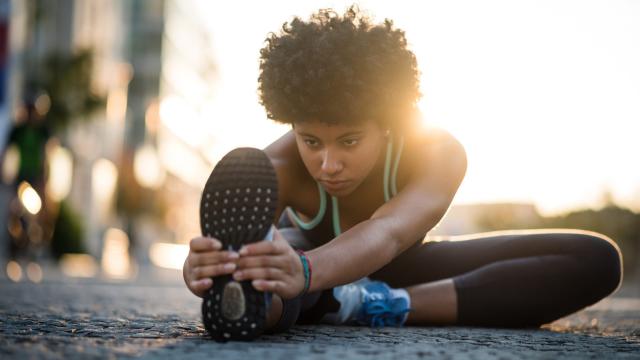Hands up if you feel tired today? Me too. With our busy lives, and y’know, the stress of a pandemic to carry, it can be difficult to keep energy levels high. Especially if your nightly sleep routine isn’t on point (which it rarely is for most of us).
While we’ve chatted a number of times about the long list of things that could be getting in the way of restful snooze, we haven’t before explored the relationship between exercise and sleep – in depth.
Brodie Hicks, Australian Institute of Fitness MasterCoach explained to me over email that these two elements of our health are not only connected; “sleep and exercise are reliant on one another”.
Here’s how.
Sleep is the most important aspect of your fitness routine
Hicks shared that, “from a [fitness] recovery standpoint” sleep is your number one asset. He pointed out that while there has been a considerable investment in technologies around massagers and muscle stimulators in recent years “the research still suggests that sleep, nutrition and hydration are the keys to an effective recovery process”.
You see, your body does some pretty cool things while you sleep.
“While we know the importance of ingesting adequate amounts of protein after exercise to aid in muscle recovery and growth, our body actually produces its own hormones to build muscle while we sleep,” Hicks said.
According to research, Hicks highlighted, a solid amount of sleep (7-9 hours) will boost the amount of Human Growth Hormone (HGH) released in the body. This hormone is what helps your body to recover post-workout.
“Therefore, the better you sleep, the quicker you recover, and the more exercise you can sustain.”
A lack of sleep will interrupt this process and impede your body’s ability to recover throughout your fitness journey. More than that, however, Hicks shared that “poor sleep has been shown to reduce the intensity at which you can train, while simultaneously making it feel harder than usual”.
“Studies have also shown that individuals who regularly sleep less than 5 hours a night are more likely to gain weight [compared] to those who sleep between 7-9 hours.”
On the flip side, exercise can improve your sleep quality, too
For the fitness fans in the room, you’ll likely know the feeling of hitting the pillow after an active day. Sleep is rarely ever as good as it is after a solid workout.
But there’s science behind this, too. Hicks pointed out that research indicates “regular resistance and cardiovascular exercise assists in improving sleep quality over time, and in some cases, can even reverse the effects of insomnia”.
In short: “good quality sleep is required to improve exercise performance, while regular exercise can assist with improving sleep quality,” he said.
Improve your sleep hygiene for your overall health
If you’d like to get your sleep habits in line, Hicks shared a few pointers, in addition to fitness tips, worth paying attention to.
He suggests:
- Creating a routine. Try to go to bed and wake up at the same time each day.
- Ensure the room temperature is at a comfortable level, is dark, and is quiet.
- Avoid stimulation close to bedtime (within 30 mins), which can include phones, TV and computers.
- Avoid caffeinated drinks close to bedtime.
- Avoid drugs such as alcohol and smoking before bed.
- Try to keep your bed for sleeping and intimacy only.
Now, who’s ready for a nap?
This article has been updated since its original publish date.

Leave a Reply
You must be logged in to post a comment.